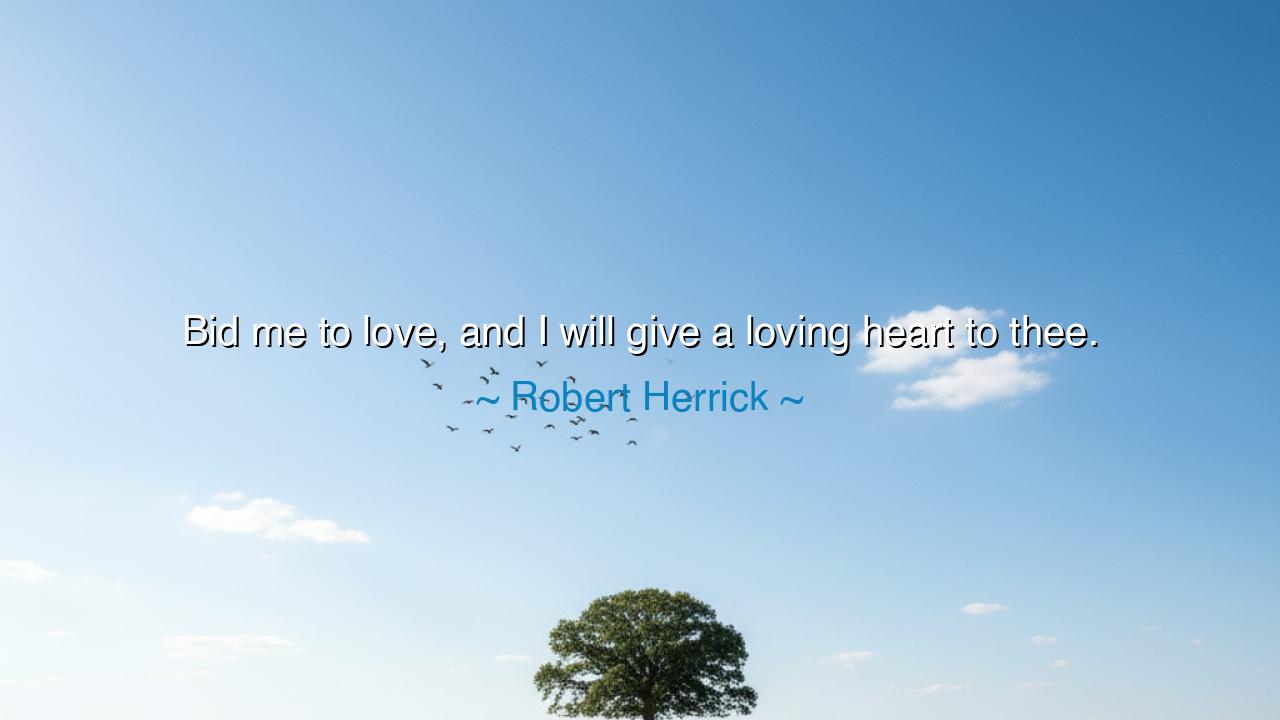
Bid me to love, and I will give a loving heart to thee.






The words of Robert Herrick echo like the soft tolling of a bell across centuries: “Bid me to love, and I will give a loving heart to thee.” In this single line lies the essence of surrender, of devotion, of the ancient bond between command and gift. Herrick, a poet of the seventeenth century, was steeped in the traditions of pastoral beauty and romantic idealism. His words are not merely the utterance of passion but the voice of one who understands that true love is not reluctant, not withheld, but freely given when invited.
This declaration reveals the sacred nature of willingness in love. For what is love if not a choice? Herrick tells us that to be asked to love is to be honored, and in response, he offers not half his heart, but a loving heart, whole and unbroken. His words remind us that love, though born of feeling, is also an act of volition: it is something we can offer, something we can dedicate, something we can vow. In this, his poetry joins the wisdom of the ancients, who saw in love both the fire of passion and the discipline of commitment.
The Greeks sang of such devotion in the tale of Alcestis, who offered her life in place of her husband Admetus. When fate demanded his death, she stepped forward, bidding herself to love in the highest form of sacrifice. In giving her life, she gave not only her heart but her very being. Herrick’s words, though gentle, carry the same truth: when love is called for, the true lover does not hesitate but responds with the fullness of self.
There is also humility in this line. Herrick does not say, “I will love you whether you desire it or not.” Instead, he places the power in the beloved’s hands: “Bid me to love.” In this we see the gentleness of true affection, which never forces, never demands, but waits for permission to give itself entirely. Love that is pure does not conquer by force—it surrenders by choice. This is the nobility of his heart: his love is an offering, not a chain.
And yet, his words are also heroic. To declare that one will give a loving heart is no small thing. It is to promise devotion, loyalty, tenderness, and sacrifice. Many give pieces of affection, many offer passion without constancy, but Herrick promises the heart in its entirety. In the eyes of the ancients, such a vow was as binding as an oath of knighthood, as solemn as a covenant before the gods.
The lesson here is clear: when love is called for, do not give it half-heartedly. Do not offer fragments of affection or words without deeds. Instead, give a loving heart, whole and undivided. And yet, give it freely only when invited, for love forced is not love but bondage. True romance lies in the balance of freedom and surrender, where one chooses to offer all in response to the call of the beloved.
Therefore, let all who hear these words take action: when asked to love—whether by a partner, a friend, or life itself—answer with fullness. Do not hold back through fear of loss or fear of vulnerability. For the heart kept in chains withers, but the heart given blooms. In Herrick’s wisdom we are reminded that love is the greatest offering, and to give it wholly is the noblest act of the soul.
Thus his words endure across time, as both invitation and promise: “Bid me to love, and I will give a loving heart to thee.” May we, too, live with such courage, offering our hearts not in fragments, but in wholeness, whenever love calls.






AAdministratorAdministrator
Welcome, honored guests. Please leave a comment, we will respond soon